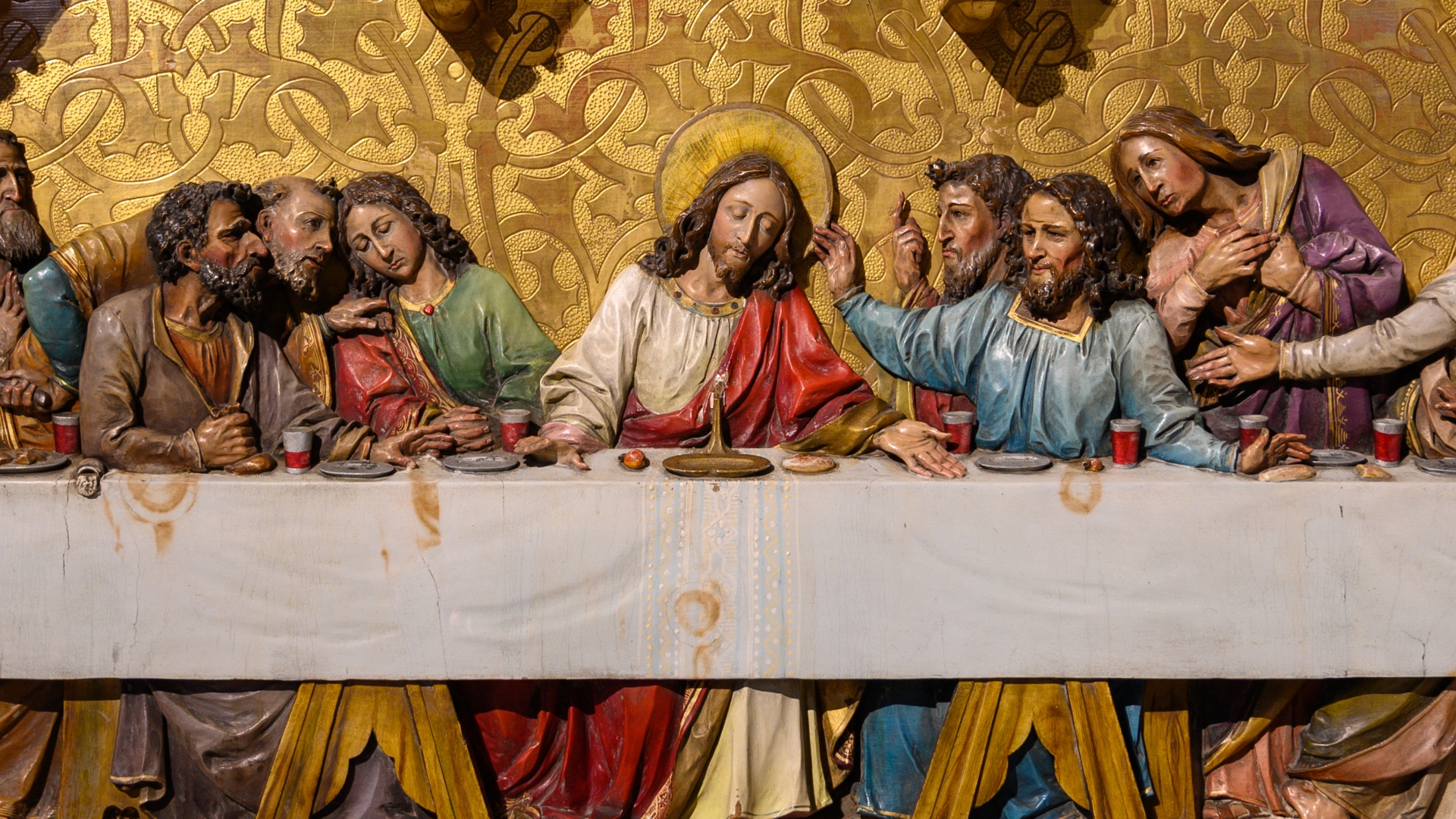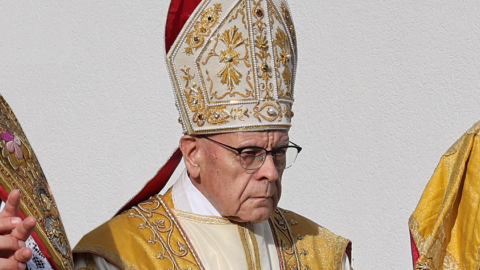Cardinal Newman’s Meditations for Maundy Thursday

A sculpture of the Last Supper according to the painting by Leonardo da Vinci. St Martin's Cathedral, Bratislava
The following meditations are taken from Cardinal John Henry Newman’s “Meditations on Christian Doctrine,” which were collected posthumously at the end of the 19th century by his executor, Fr. William Paine Neville. These meditations were intended originally to be performed following a visit to the Blessed Sacrament.
Meditation 1
His bodily pains were greater than those of any martyr, because He willed them to be greater. All pain of body depends, as to be felt at all, so to be felt in this or that degree, on the nature of the living mind which dwells in that body. Vegetables have no feeling because they have no living mind or spirit within them. Brute animals feel more or less according to the intelligence within them. Man feels more than any brute, because he has a soul; Christ's soul felt more than that of any other man, because His soul was exalted by personal union with the Word of God. Christ felt bodily pain more keenly than any other man, as much as man feels pain more keenly than any other animal.
Meditation 2
It is a relief to pain to have the thoughts drawn another way. Thus, soldiers in battle often do not know when they are wounded. Again, persons in raging fevers seem to suffer a great deal; then afterwards they can but recollect general discomfort and restlessness. And so excitement and enthusiasm are great alleviations of bodily pain; thus savages die at the stake amid torments singing songs; it is a sort of mental drunkenness. And so again, an instantaneous pain is comparatively bearable; it is the continuance of pain which is so heavy, and if we had no memory of the pain we suffered last minute, and also suffer in the present, we should find pain easy to bear; but what makes the second pang grievous is because there has been a first pang; and what makes the third more grievous is that there has been a first and second; the pain seems to grow because it is prolonged. Now Christ suffered, not as in a delirium or in excitement, or in inadvertency, but He looked pain in the face! He offered His whole mind to it, and received it, as it were, directly into His bosom, and suffered all He suffered with a full consciousness of suffering.
Meditation 3
Christ would not drink the drugged cup which was offered to Him to cloud His mind. He willed to have the full sense of pain. His soul was so intently fixed on His suffering as not to be distracted from it; and it was so active, and recollected the past and anticipated the future, and the whole passion was, as it were, concentrated on each moment of it, and all that He had suffered and all that He was to suffer lent its aid to increase what He was suffering. Yet withal His soul was so calm and sober and unexcited as to be passive, and thus to receive the full burden of the pain on it, without the power of throwing it off Him. Moreover, the sense of conscious innocence, and the knowledge that His sufferings would come to an end, might have supported Him; but He repressed the comfort and turned away His thoughts from these alleviations that He might suffer absolutely and perfectly.
O my God and Saviour, who went through such sufferings for me with such lively consciousness, such precision, such recollection, and such fortitude, enable me, by Thy help, if I am brought into the power of this terrible trial, bodily pain, enable me to bear it with some portion of Thy calmness. Obtain for me this grace, O Virgin Mother, who didst see thy Son suffer and didst suffer with Him; that I, when I suffer, may associate my sufferings with His and with thine, and that through His passion, and thy merits and those of all Saints, they may be a satisfaction for my sins and procure for me eternal life.
Meditation 4
Our Lord's sufferings were so great, because His soul was in suffering. What shows this is that His soul began to suffer before His bodily passion, as we see in the agony in the garden. The first anguish which came upon His body was not from without—it was not from the scourges, the thorns, or the nails, but from His soul. His soul was in such agony that He called it death: "My soul is sorrowful even unto death." The anguish was such that it, as it were, burst open His whole body. It was a pang affecting His heart; as in the deluge the floods of the great deep were broken up and the windows of heaven were open. The blood, rushing from his tormented heart, forced its way on every side, formed for itself a thousand new channels, filled all the pores, and at length stood forth upon His skin in thick drops, which fell heavily on the ground.
Meditation 5
He remained in this living death from the time of His agony in the garden; and as His first agony was from His soul, so was His last. As the scourge and the cross did not begin His sufferings, so they did not close them. It was the agony of His soul, not of His body, which caused His death. His persecutors were surprised to hear that He was dead. How, then, did He die? That agonised, tormented heart, which at the beginning so awfully relieved itself in the rush of blood and the bursting of His pores, at length broke. It broke and He died. It would have broken at once, had He not kept it from breaking. At length the moment came. He gave the word and His heart broke.
Meditation 6
O tormented heart, it was love, and sorrow, and fear, which broke Thee. It was the sight of human sin, it was the sense of it, the feeling of it laid on Thee; it was zeal for the glory of God, horror at seeing sin so near Thee, a sickening, stifling feeling at its pollution, the deep shame and disgust and abhorrence and revolt which it inspired, keen pity for the souls whom it has drawn headlong into hell—all these feelings together Thou didst allow to rush upon Thee. Thou didst submit Thyself to their powers, and they were Thy death. That strong heart, that all-noble, all-generous, all-tender, all-pure heart was slain by sin.
O most tender and gentle Lord Jesus, when will my heart have a portion of Thy perfections? When will my hard and stony heart, my proud heart, my unbelieving, my impure heart, my narrow selfish heart, be melted and conformed to Thine? O teach me so to contemplate Thee that I may become like Thee, and to love Thee sincerely and simply as Thou hast loved me.
US District - sspx.org - 03/27/2024





